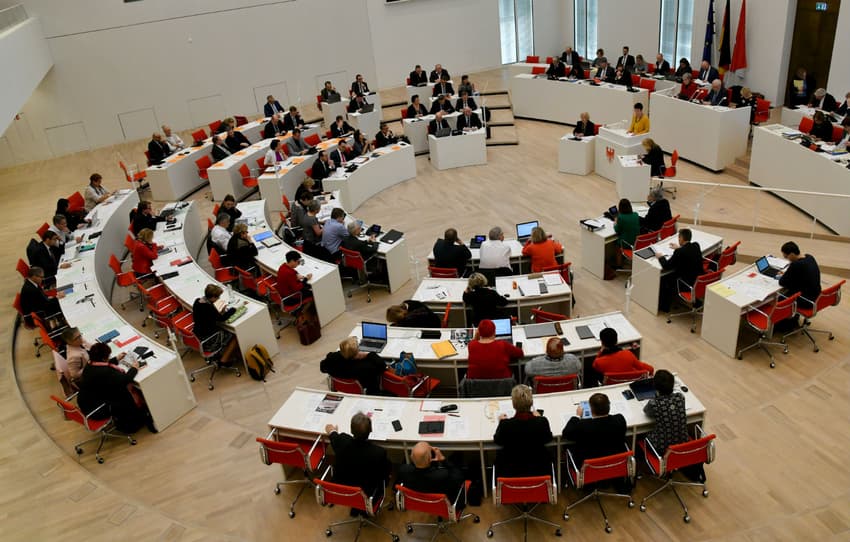Brandenburg approves landmark law to boost number of women in parliament

The state of Brandenburg, a neighbouring state of Berlin, has approved a new landmark law aimed at boosting the number of women in state parliament.
In future state elections in the eastern German state, parties will have to put forward electoral lists with equal numbers of women and men. The so-called “parity law” was passed by the state parliament in Potsdam - the first state in Germany to do so.
The aim is to ensure that around the same number of men and women sit in future state parliaments, reported Berlin and Brandenburg broadcaster, RBB.
The law was put forward by the Greens and voted through by a majority due to support from coalition parties, the centre-left Social Democrats (SPD) and the Left Party (Die Linke)
It won’t impact Brandenburg's upcoming state parliamentary elections, which are due to take place on September 1st this year, but, if all goes to plan, it will come into force in 2020.
The landmark legislation comes 100 years after the introduction of women's suffrage in Germany. It also follows Berlin’s decision in January to officially make Frauentag (Women’s Day) a public holiday.
SEE ALSO: What you should know about Frauentag, Berlin's newest holiday
SPD faction leader Mike Bischoff described the move as “pioneering”.
It has been widely welcomed, with many people on social media calling it a step forward and a "historic moment".
Historischer Moment in #Brandenburg: nach kontroverser Debatte verabschiedet der Landtag als erstes Parlament in Deutschland ein #paritätsgesetz pic.twitter.com/tgg6MShHFo
— Dominik Lenz (@Dominik_Lenz) January 31, 2019The state of Brandenburg, a neighbouring state of Berlin, has approved a new landmark law aimed at boosting the number of women in politics.
In Brandenburg's current 88-member Parliament, only 35 of members are women, the lowest proportion in 28 years.
The Greens, who proposed the bill, put forward that having equal numbers of men and women on party electoral lists was constitutional.
.@UNonnemacher "Die heute beschlossene gesetzliche Verankerung quotierter Wahllisten ist ein großer Erfolg, mit dem Brandenburg Geschichte schreibt." #paritaetsgesetz https://t.co/TYsMi7x8du pic.twitter.com/GMGEJtB1xV
— B'90/Die Grünen LTBB (@GrueneLTBB) January 31, 2019
SEE ALSO: 100 years of female suffrage in Germany: The unknown story
The centre-right Christian Democrats (CDU) and the far-right Alternative for Germany (AfD) voted against the bill, saying it was unconstitutional.
Meanwhile, there's already been some pushback to the law, with some smaller parties saying they will go against it at court.
Parity laws are aimed at equal representation of men and women. France passed gender parity laws in 2000.
Comments
See Also
In future state elections in the eastern German state, parties will have to put forward electoral lists with equal numbers of women and men. The so-called “parity law” was passed by the state parliament in Potsdam - the first state in Germany to do so.
The aim is to ensure that around the same number of men and women sit in future state parliaments, reported Berlin and Brandenburg broadcaster, RBB.
The law was put forward by the Greens and voted through by a majority due to support from coalition parties, the centre-left Social Democrats (SPD) and the Left Party (Die Linke)
It won’t impact Brandenburg's upcoming state parliamentary elections, which are due to take place on September 1st this year, but, if all goes to plan, it will come into force in 2020.
The landmark legislation comes 100 years after the introduction of women's suffrage in Germany. It also follows Berlin’s decision in January to officially make Frauentag (Women’s Day) a public holiday.
SEE ALSO: What you should know about Frauentag, Berlin's newest holiday
SPD faction leader Mike Bischoff described the move as “pioneering”.
It has been widely welcomed, with many people on social media calling it a step forward and a "historic moment".
Historischer Moment in #Brandenburg: nach kontroverser Debatte verabschiedet der Landtag als erstes Parlament in Deutschland ein #paritätsgesetz pic.twitter.com/tgg6MShHFo
— Dominik Lenz (@Dominik_Lenz) January 31, 2019The state of Brandenburg, a neighbouring state of Berlin, has approved a new landmark law aimed at boosting the number of women in politics.
In Brandenburg's current 88-member Parliament, only 35 of members are women, the lowest proportion in 28 years.
The Greens, who proposed the bill, put forward that having equal numbers of men and women on party electoral lists was constitutional.
.@UNonnemacher "Die heute beschlossene gesetzliche Verankerung quotierter Wahllisten ist ein großer Erfolg, mit dem Brandenburg Geschichte schreibt." #paritaetsgesetz https://t.co/TYsMi7x8du pic.twitter.com/GMGEJtB1xV
— B'90/Die Grünen LTBB (@GrueneLTBB) January 31, 2019
SEE ALSO: 100 years of female suffrage in Germany: The unknown story
The centre-right Christian Democrats (CDU) and the far-right Alternative for Germany (AfD) voted against the bill, saying it was unconstitutional.
Meanwhile, there's already been some pushback to the law, with some smaller parties saying they will go against it at court.
Parity laws are aimed at equal representation of men and women. France passed gender parity laws in 2000.
Join the conversation in our comments section below. Share your own views and experience and if you have a question or suggestion for our journalists then email us at [email protected].
Please keep comments civil, constructive and on topic – and make sure to read our terms of use before getting involved.
Please log in here to leave a comment.